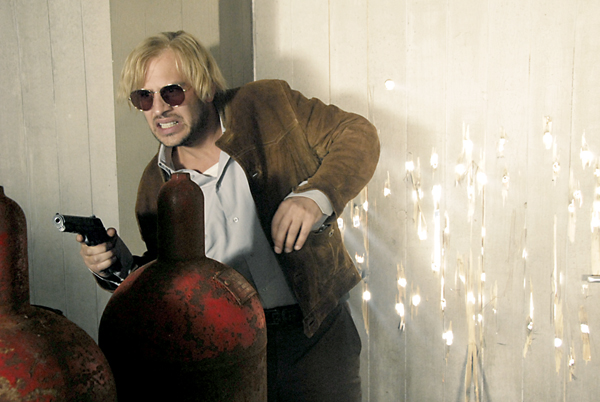|
Reviews of Recent Independent, Foreign, & Documentary Films in Theaters and DVD/Home Video

THE
BAADER MEINHOF COMPLEX
The long film remains gripping because of the three captivating central figures (despite their turgid rhetoric)—two women who abandoned their children for the cause and a rock star poseur who turns into a passionate defender of dissent. Ulrike Meinhof (Martina Gedeck, unrecognizable from her role in The Lives Of Others) is first seen as a jealous wife on a nude beach. She transforms into the most prominent journalist defending extreme left provocateurs, then facilitates a prison escape and runs away with them. Her theoretical manifestos lead the press to misperceive her as the co-leader. Andreas Baader (Moritz Bleibtreu) is not only charismatic as a demanding leader. While others engage in free love, he sustains a pivotal and tender Bonnie and Clyde partnership with Gudrun Ensslin (Johanna Wokalek, startling in her first major role), a beautiful blonde pastor’s daughter who channels her faith into an unstinting and uncompromising determination, while donning endless disguises. (Her parents can’t help but admire her commitment.) The first half parallels Michael Mann’s Public Enemies, and not just for the bank heists that funded the group’s fiery attacks on corporate, media, and government targets. Their actions led to a more sophisticated and systematic federal police operation that eerily echoed the rise of Herbert Hoover’s FBI. In one of the few weak notes, though, Horst Herold (Bruno Ganz), the head of the federal police force, sounds too prescient in explaining how to organize computer data to invade individual privacy in the name of national security. The second half is both more confusing to follow and frighteningly relevant to today’s quandary of dealing with terrorists. While there is no one scene as philosophical as Bobby Sands’s monologue in Steve McQueen’s Hunger, the RAF’s hunger strikes against rigid prison conditions and the judicial system take a toll on the law enforcement system as much as on their minds and bodies. Even in solitary confinement, the founding leadership becomes larger than life symbols who beget the explosive second generation, and more. Their international reach expands with the kidnappings, coordinated hijackings, and assassinations that culminate in the harrowing “German Autumn” (actual TV and press coverage is continually interwoven, though not always translated). Like a harbinger of the 21st century, events in the Middle East triggered the initial peaceful protest (against the Shah of Iran’s Berlin visit) that gave the movement its first martyr, and then contributed to the RAF ratcheting up the violence, which was countered with the German government’s reactive repression. The group only occasionally raises the specter of their parents’ generation’s inaction against the rise of the Nazis as a raison d’être for their own means justifying the ends. And after they find common anti-imperialist cause with the Palestinians, their initial culture clash at a training camp in Jordan would be comical if their Stasi-funded tactics didn’t have bloody consequences.
Even without any previous knowledge of the participants,
The Baader Meinhof Complex is fascinating. Just as the
military belatedly studied
Gillo Pontecorvo’s
Battle for Algiers to understand nationalist insurgents, they
would do well to add this stark look at ideological terrorism within a
democracy to the war college curriculum.
Nora Lee Mandel
|

